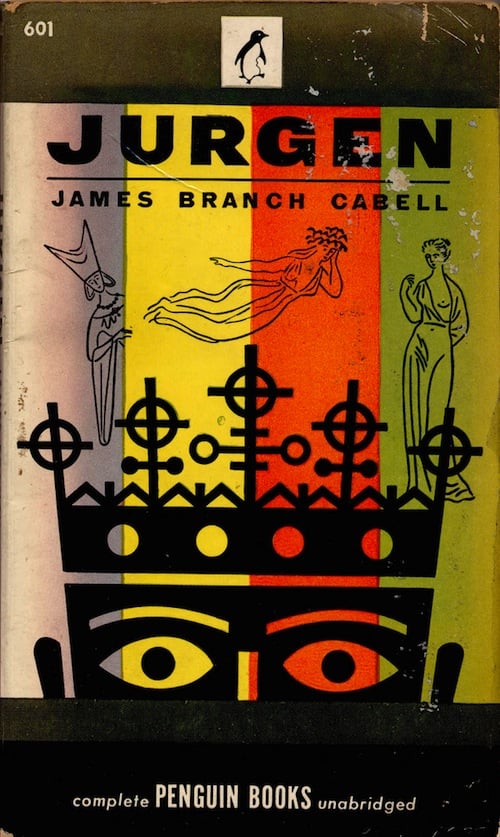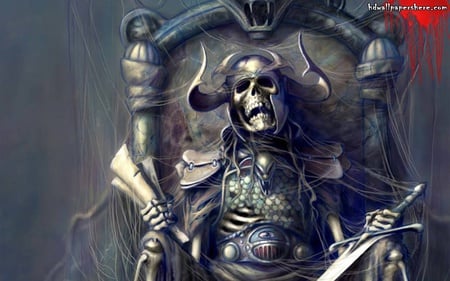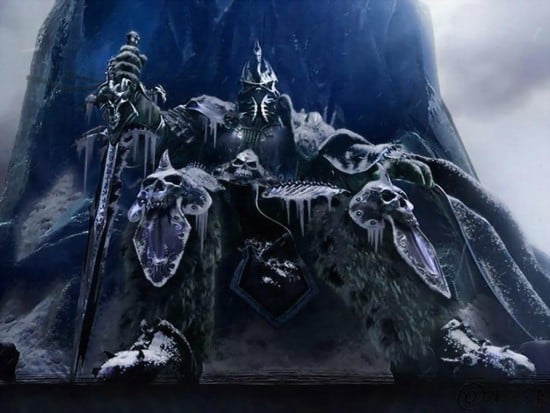Jurgen (10)
By:
May 18, 2015

James Branch Cabell’s 1919 ironic fantasy novel Jurgen, A Comedy of Justice, the protagonist of which seduces women everywhere he travels — including into Arthurian legend and Hell itself — is (according to Aleister Crowley) one of the “epoch-making masterpieces of philosophy.” Cabell’s sardonic inversion of romantic fantasy was postmodernist avant la lettre. HiLoBooks is pleased to serialize Jurgen here at HILOBROW. Enjoy!
Now the tale tells how the cave narrowed and again turned sharply, so that Jurgen came as through a corridor into quite another sort of underground chamber. Yet this also was a discomfortable place.
Here suspended from the roof of the vault was a kettle of quivering red flames. These lighted a very old and villainous looking man in full armor, girded with a sword, and crowned royally: he sat erect upon a throne, motionless, with staring eyes that saw nothing. Back of him Jurgen noted many warriors seated in rows, and all staring at Jurgen with wide-open eyes that saw nothing. The red flaming of the kettle was reflected in all these eyes, and to observe this was not pleasant.

Jurgen waited non-committally. Nothing happened. Then Jurgen saw that at this unengaging monarch’s feet were three chests. The lids had been ripped from two of them, and these were filled with silver coins. Upon the middle chest, immediately before the king, sat a woman, with her face resting against the knees of the glaring, withered, motionless, old rascal.
“And this is a young woman. Obviously! Observe the glint of that thick coil of hair! the rich curve of the neck! Oh, clearly, a tidbit fit to fight for, against any moderate odds!”
So ran the thoughts of Jurgen. Bold as a dragon now, he stepped forward and lifted the girl’s head.
Her eyes were closed. She was, even so, the most beautiful creature Jurgen had ever imagined.
“She does not breathe. And yet, unless memory fails me, this is certainly a living woman in my arms. Evidently this is a sleep induced by necromancy. Well, it is not for nothing I have read so many fairy tales. There are orthodoxies to be observed in the awakening of every enchanted princess. And Lisa, wherever she may be, poor dear! is nowhere in this neighborhood, because I hear nobody talking. So I may consider myself at liberty to do the traditional thing by this princess. Indeed, it is the only fair thing for me to do, and justice demands it.”

In consequence, Jurgen kissed the girl. Her lips parted and softened, and they assumed a not unpleasant sort of submissive ardor. Her eyes, enormous when seen thus closely, had languorously opened, had viewed him without wonder, and then the lids had fallen, about half-way, just as, Jurgen remembered, the eyelids of a woman ought to do when she is being kissed properly. She clung a little, and now she shivered a little, but not with cold: Jurgen perfectly remembered that ecstatic shudder convulsing a woman’s body: everything, in fine, was quite as it should be. So Jurgen put an end to the kiss, which, as you may surmise, was a tolerably lengthy affair.
His heart was pounding as though determined to burst from his body, and he could feel the blood tingling at his finger-tips. He wondered what in the world had come over him, who was too old for such emotions.
Yet, truly, this was the loveliest girl that Jurgen had ever imagined. Fair was she to look on, with her shining gray eyes and small smiling lips, a fairer person might no man boast of having seen. And she regarded Jurgen graciously, with her cheeks flushed by that red flickering overhead, and she was very lovely to observe. She was clothed in a robe of flame-colored silk, and about her neck was a collar of red gold. When she spoke her voice was music.
“I knew that you would come,” the girl said, happily.
“I am very glad that I came,” observed Jurgen.
“But time presses.”
“Time sets an admirable example, my dear Princess —”
“Oh, messire, but do you not perceive that you have brought life into this horrible place! You have given of this life to me, in the most direct and speedy fashion. But life is very contagious. Already it is spreading by infection.”
And Jurgen regarded the old king, as the girl indicated. The withered ruffian stayed motionless: but from his nostrils came slow augmenting jets of vapor, as though he were beginning to breathe in a chill place. This was odd, because the cave was not cold.
“And all the others too are snorting smoke,” says Jurgen. “Upon my word I think this is a delightful place to be leaving.”
First, though, he unfastened the king’s sword-belt, and girded himself therewith, sword, dagger and all. “Now I have arms befitting my fine shirt,” says Jurgen.

Then the girl showed him a sort of passage way, by which they ascended forty-nine steps roughly hewn in stone, and so came to daylight. At the top of the stairway was an iron trapdoor, and this door at the girl’s instruction Jurgen lowered. There was no way of fastening the door from without.
“But Thragnar is not to be stopped by bolts or padlocks,” the girl said. “Instead, we must straightway mark this door with a cross, since that is a symbol which Thragnar cannot pass.”
Jurgen’s hand had gone instinctively to his throat. Now he shrugged.
“My dear young lady, I no longer carry the cross. I must fight Thragnar with other weapons.”
“Two sticks will serve, laid crosswise —”
Jurgen submitted that nothing would be easier than to lift the trapdoor, and thus dislodge the sticks. “They will tumble apart without anyone having to touch them, and then what becomes of your crucifix?”
“Why, how quickly you think of everything!” she said, admiringly. “Here is a strip from my sleeve, then. We will tie the twigs together.”
Jurgen did this, and laid upon the trapdoor a recognizable crucifix. “Still, when anyone raises the trapdoor whatever lies upon it will fall off. Without disparaging the potency of your charm, I cannot but observe that in this case it is peculiarly difficult to handle. Magician or no, I would put heartier faith in a stout padlock.”
So the girl tore another strip, from the hem of her gown, and then another from her right sleeve, and with these they fastened their cross to the surface of the trapdoor, in such a fashion that the twigs could not be dislodged from beneath. They mounted the fine steed whose bridle was marked with a coronet, the girl riding pillion, and they turned westward, since the girl said this was best.
For, as she now told Jurgen, she was Guenevere, the daughter of Gogyrvan, King of Glathion and the Red Islands. So Jurgen told her he was the Duke of Logreus, because he felt it was not appropriate for a pawnbroker to be rescuing princesses: and he swore, too, that he would restore her safely to her father, whatever Thragnar might attempt. And all the story of her nefarious capture and imprisonment by King Thragnar did Dame Guenevere relate to Jurgen, as they rode together through the pleasant May morning.
She considered the Troll King could not well molest them. “For now you have his charmed sword, Caliburn, the only weapon with which Thragnar can be slain. Besides, the sign of the cross he cannot pass. He beholds and trembles.”
“My dear Princess, he has but to push up the trapdoor from beneath, and the cross, being tied to the trapdoor, is promptly moved out of his way. Failing this expedient, he can always come out of the cave by the other opening, through which I entered. If this Thragnar has any intelligence at all and a reasonable amount of tenacity, he will presently be at hand.”
“Even so, he can do no harm unless we accept a present from him. The difficulty is that he will come in disguise.”
“Why, then, we will accept gifts from nobody.”
“There is, moreover, a sign by which you may distinguish Thragnar. For if you deny what he says, he will promptly concede you are in the right. This was the curse put upon him by Miramon Lluagor, for a detection and a hindrance.”
“By that unhuman trait,” says Jurgen, “Thragnar ought to be very easy to distinguish.”
Footnotes from Notes on Jurgen (1928), by James P. Cover — with additional comments from the creators of this website; rewritten, in some instances, by HiLoBooks.
* Thragnar — Perhaps Thragnar and certainly the episode with which he is here connected have their origin in the Northern Sagas. In the Saga of Hromund Greipson, Thrain the Viking is discovered, like Thragnar here, seated in an underground place, fully armed, with a kettle of quivering red flames over his head and at his feet three chests of silver. In another saga the demon king Raknar is found by the hero, fifty fathoms under ground, seated in his ship surrounded by five hundred of his men, who breathe jets of vapor from their nostrils. The northern heroes were not so lucky as Jurgen, for they found no maidens with the buried kings and had to fight before they got either treasures or swords. Could the name Thragnar have been made by combining the words Thrain and Raknar?
* Guenevere — This is the Guenevere made familiar to us by Malory and Tennyson; she is the future wife of King Arthur, the legendary hero of Britain.
* Gogyrvan — According to ancient Welsh legends, Arthur had three queens and each of them was named Guenevere. The third of these was the daughter of Gogyrvan [also Gogrvan, Ogrvan, Ogyrvan, Ogyrfan, Ogrfran, Ogfran, Ocvran] Gawr. The following rime concerning her was, for a long while, current in Wales:
Gwenhwyvar, the daughter of Gogyrvan the Giant,
Bad when little, worse when great.
* Glathion — ?
* Red Islands — ?
* Logreus — Logres was a name for certain parts of Britain in the days of King Arthur.
* Caliburn — Caliburn was another name for Excalibur, King Arthur’s magic sword.
* Miramon Lluagor — Miramon Lluagor, we are told in Figures of Earth, was a noted magician, lord of the kind kinds of sleep and prince of the seven madnesses, who helped Manuel to conquer Poictesme.
RADIUM AGE SCIENCE FICTION: “Radium Age” is HILOBROW’s name for the 1904–33 era, which saw the discovery of radioactivity, the revelation that matter itself is constantly in movement — a fitting metaphor for the first decades of the 20th century, during which old scientific, religious, political, and social certainties were shattered. This era also saw the publication of genre-shattering writing by Edgar Rice Burroughs, Sax Rohmer, E.E. “Doc” Smith, Jack London, Arthur Conan Doyle, Aldous Huxley, Olaf Stapledon, Karel Čapek, H.P. Lovecraft, Charlotte Perkins Gilman, Yevgeny Zamyatin, Philip Gordon Wylie, and other pioneers of post-Verne/Wells, pre-Golden Age “science fiction.” More info here.
READ GORGEOUS PAPERBACKS: HiLoBooks has reissued the following 10 obscure but amazing Radium Age science fiction novels in beautiful print editions: Jack London’s The Scarlet Plague, Rudyard Kipling’s With the Night Mail (and “As Easy as A.B.C.”), Arthur Conan Doyle’s The Poison Belt, H. Rider Haggard’s When the World Shook, Edward Shanks’ The People of the Ruins, William Hope Hodgson’s The Night Land, J.D. Beresford’s Goslings, E.V. Odle’s The Clockwork Man, Cicely Hamilton’s Theodore Savage, and Muriel Jaeger’s The Man with Six Senses. For more information, visit the HiLoBooks homepage.
SERIALIZED BY HILOBOOKS: Jack London’s The Scarlet Plague | Rudyard Kipling’s With the Night Mail (and “As Easy as A.B.C.”) | Arthur Conan Doyle’s The Poison Belt | H. Rider Haggard’s When the World Shook | Edward Shanks’ The People of the Ruins | William Hope Hodgson’s The Night Land | J.D. Beresford’s Goslings | E.V. Odle’s The Clockwork Man | Cicely Hamilton’s Theodore Savage | Muriel Jaeger’s The Man With Six Senses | Jack London’s “The Red One” | Philip Francis Nowlan’s Armageddon 2419 A.D. | Homer Eon Flint’s The Devolutionist | W.E.B. DuBois’s “The Comet” | Edgar Rice Burroughs’s The Moon Men | Charlotte Perkins Gilman’s Herland | Sax Rohmer’s “The Zayat Kiss” | Eimar O’Duffy’s King Goshawk and the Birds | Frances Hodgson Burnett’s The Lost Prince | Morley Roberts’s The Fugitives | Helen MacInnes’s The Unconquerable | Geoffrey Household’s Watcher in the Shadows | William Haggard’s The High Wire | Hammond Innes’s Air Bridge | James Branch Cabell’s Jurgen | John Buchan’s “No Man’s Land” | John Russell’s “The Fourth Man” | E.M. Forster’s “The Machine Stops” | John Buchan’s Huntingtower | Arthur Conan Doyle’s When the World Screamed | Victor Bridges’ A Rogue By Compulsion | Jack London’s The Iron Heel | H. De Vere Stacpoole’s The Man Who Lost Himself | P.G. Wodehouse’s Leave It to Psmith | Richard Connell’s “The Most Dangerous Game” | Houdini and Lovecraft’s “Imprisoned with the Pharaohs” | Arthur Conan Doyle’s “The Sussex Vampire.”
ORIGINAL FICTION: HILOBROW has serialized three novels: James Parker’s The Ballad of Cocky The Fox (“a proof-of-concept that serialization can work on the Internet” — The Atlantic); Karinne Keithley Syers’s Linda Linda Linda (which includes original music); and Robert Waldron’s roman à clef The School on the Fens. We also publish original stories and comics. These include: Matthew Battles’s stories “Gita Nova“, “Makes the Man,” “Imago,” “Camera Lucida,” “A Simple Message”, “Children of the Volcano”, “The Gnomon”, “Billable Memories”, “For Provisional Description of Superficial Features”, “The Dogs in the Trees”, “The Sovereignties of Invention”, and “Survivor: The Island of Dr. Moreau”; several of these later appeared in the collection The Sovereignties of Invention | Peggy Nelson’s “Mood Indigo“, “Top Kill Fail“, and “Mercerism” | Annalee Newitz’s “The Great Oxygen Race” | Flourish Klink’s Star Trek fanfic “Conference Comms” | Charlie Mitchell’s “A Fantasy Land” | Charlie Mitchell’s “Sentinels” | Joshua Glenn’s “The Lawless One”, and the mashup story “Zarathustra vs. Swamp Thing” | Adam McGovern and Paolo Leandri’s Idoru Jones comics | John Holbo’s “Sugarplum Squeampunk” | “Another Corporate Death” (1) and “Another Corporate Death” (2) by Mike Fleisch | Kathryn Kuitenbrouwer and Frank Fiorentino’s graphic novel “The Song of Otto” (excerpt) | John Holbo’s graphic novel On Beyond Zarathustra (excerpt) | “Manoj” and “Josh” by Vijay Balakrishnan | “Verge” by Chris Rossi, and his audio novel Low Priority Hero | EPIC WINS: THE ILIAD (1.408-415) by Flourish Klink | EPIC WINS: THE KALEVALA (3.1-278) by James Parker | EPIC WINS: THE ARGONAUTICA (2.815-834) by Joshua Glenn | EPIC WINS: THE MYTH OF THE ELK by Matthew Battles | TROUBLED SUPERHUMAN CONTEST: Charles Pappas, “The Law” | CATASTROPHE CONTEST: Timothy Raymond, “Hem and the Flood” | TELEPATHY CONTEST: Rachel Ellis Adams, “Fatima, Can You Hear Me?” | OIL SPILL CONTEST: A.E. Smith, “Sound Thinking | LITTLE NEMO CAPTION CONTEST: Joe Lyons, “Necronomicon” | SPOOKY-KOOKY CONTEST: Tucker Cummings, “Well Marbled” | INVENT-A-HERO CONTEST: TG Gibbon, “The Firefly” | FANFICTION CONTEST: Lyette Mercier’s “Sex and the Single Superhero”
